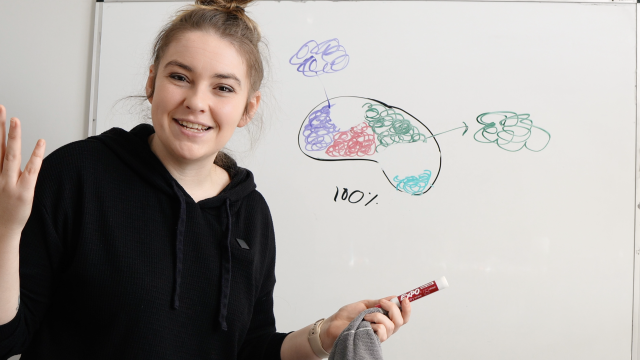In today’s video, we’re going to talk about stress and how stress is probably contributing to your ability, or in this case, inability to maintain those behaviors that make you feel your very best. I’m also going to give you my top 3 stress management techniques.
Raise your hand if you settle into a really, really good routine, and you’re doing the things you wanna do. Your habits are getting checked, the workouts are getting done, and then all of a sudden something shifts. You’re off track, you’re off your routine, it feels really hard, and everything’s going crazy. Then, after a while of being kind of in a funk, you haul yourself back over to the routine again.
If that resonates, let me know in the comments. And by the way — that’s part of being human, so don’t beat yourself up too much about it!
By the way, HI! My name is Dr. Karin Nordin, and I am an expert in all things mindset. I have my PhD in that area, and I spend literally every day of my life helping with a coaching program and various other products that we have to bring people like you the real science behind self-help.
Today, I wanna get a little bit sciencey with you. I wanna talk to you about the relationship between behavior and stress. I also wanna give you some stress management techniques to change that relationship. So even when life gets stressful, you’re able to still maintain those behaviors that matter to you. Let’s jump right in.
The first thing that you need to know about stress management techniques is a concept called Cognitive Load.
Let’s draw your brain.
Okay – hahaha. Ignore my great drawing skills, but let’s pretend that this is your brain. Right now you have a hundred percent of the space in your brain available for thinking, managing, self-regulating, or controlling your own behavior at a baseline. We actually never have a hundred percent of our brain available for this type of stuff. The reason for that is that we have demands in our lives.
For example, some of your cognitive load is taken up by all the stuff that you have to remember for your family. Plus all the errands that have to be done and all the appointments that have to be hit. Plus all of the things that are sort of daily routines that you need to remember to do.
Let’s also pretend that you’re trying to embark on a new habit. Your brain is gonna have to use some of its resources in order to create that new habit. Starting something new takes a lot of brain energy in order to change the patterns that already exist there.
So let’s say this is a normal good day. You’re in your routine, you’re able to spend this energy on adopting these new habits. You have a little bit going on in the background, but not really that much. This is your non-stressed brain.
Now, I want you to imagine that on Friday, you’re leaving for a two-week trip…
A huge part of your cognitive load is going to be taken up by thinking about the details of that trip. What needs to be packed, what needs to be done, and what needs to be changed. Let’s say that you’re also going to see people that you haven’t seen in a while. Your brain is probably worrying about what those people are going to think. You may be having some body image issues. That happens a lot when we see people we haven’t seen in a while. So there’s a lot of stress and worry that comes from the social situation you’re about to go into.
Now, I want you to imagine that on top of all that, you are taking a week off work. You have all of this work stuff that you have to figure out how to do before you even leave.
So what happens is you come to me, a behavior change expert, and you say, “Karin, why is it that I can’t maintain my healthy eating routine in one of these really, really stressful weeks?”
And I will tell you, “Look at the cognitive load your brain already has! Look at how much effort and energy your brain is spending being stressed out about these various things. Yes, healthy eating is possible, but you only have a tiny, tiny bit of bandwidth to think about it. If you need this much bandwidth in order to get the healthy eating done, then that habit is going to drop off in the face of stress.”
So then you’re asking me, “Okay, Karin, what does that mean? Do I just give up on my life whenever I’m stressed out?”
No, not at all. Let’s talk about three quick stress management techniques.
Stress Management Technique #1: Task Dump
Remember all these work tasks that you have to remember and get done? They’re probably floating around in your head. What you want to do is actually get them on paper and get super clear about everything you really need to do. When you stop holding that information in your brain and you start dumping it outside of your brain, your brain is not gonna have to hold it anymore. That cognitive space is going to open up.
Technique #2: Emotional Processing
The second stress management technique I wanna talk to you about is emotional processing. Taking five minutes to sit and allow yourself to be stressed is very important. Maybe you go for a walk and listen to a sad playlist. Maybe you cook and take some time to yourself and do some stress baking.
Remember all these emotions that you were feeling about body image? And about worrying and about all the anxieties that are coming with this trip? If you push them down and you don’t experience them, you don’t allow your brain to feel them. They’re stuck here. When you allow yourself to process them, you give yourself a chance to cry or worry or feel or experience. This gets them out of your brain, and that’s gonna open up more cognitive space.
Technique #3: “The project isn’t currently on the roadmap.”
Remember all those things you’re telling yourself in your house that have to get done? Maybe you have to do the cleaning, you have to do the cooking, you have to pack. You feel like it has to all be done this exact way. You probably have a perfectionistic idea of all the things that have to happen before you leave.
My third tip is to use one of my favorite phrases from back when I was working a corporate job. The phrase is, “That project isn’t currently on the roadmap.”
This is something that my former boss and superiors would say when we would suggest another project or something that we wanted to do. This was their way of telling us, we’re not gonna be doing that right now. I want you to try to use that language. When you walk past that pile of laundry sitting in the hallway and you know it’s not gonna get done before you leave, simply ignore it. Tell yourself, “That project isn’t on the roadmap right now.”
You’re telling yourself, “Hey, that task simply isn’t going to get done.”
You remove it from your brain and all of a sudden you open up space. So look at your brain now in comparison to where it was earlier. There’s so much more space available here. Now you have room to stick with those habits and routines even during the moments that you’re stressed.
If you really need help improving your stress coping skills and managing situations like this, we have a solurion. One of the number one things we do with clients in Alliance Coaching is help them get off the rollercoaster. A lot of our clients come to us feeling like they’re on one minute and off the next. Things are good — and then they’re in a funk. It’s a rollercoaster of emotions, behaviors, and routines all the time.
If you wanna level out and feel more regular. Or if you wanna feel more grounded and intentional with your behavior, and in your life, Alliance Coaching is the number one thing I would encourage you to look at.
Oh, and by the way, I gave you some really concrete tips here. If you want even more tips on how to reduce stress in your life and make it so this cognitive load situation never happens in the first place, make sure to check out my previous post, which is all about how to reduce stress. You can also watch it on YouTube.




